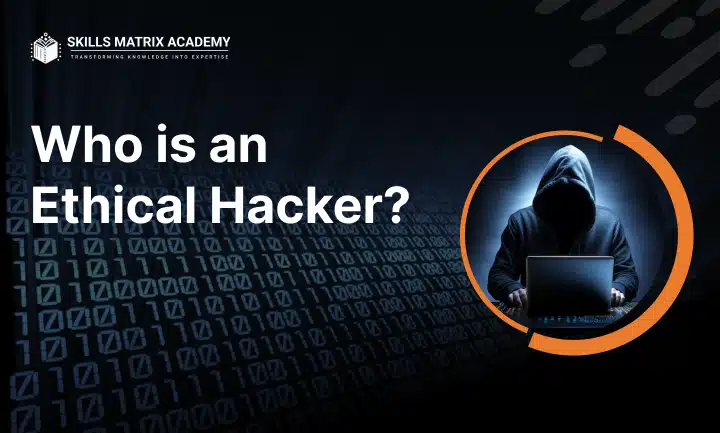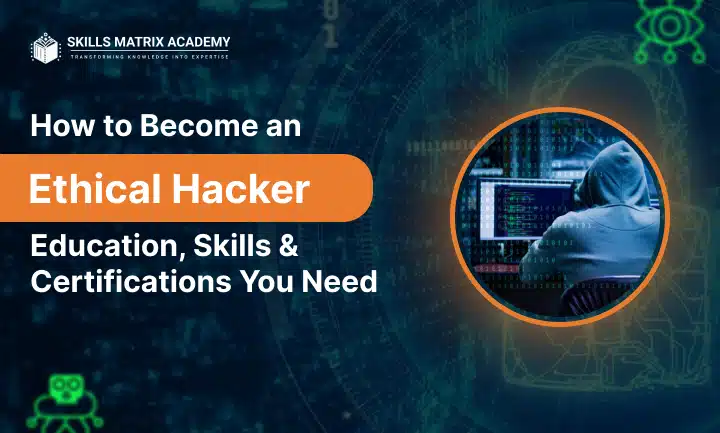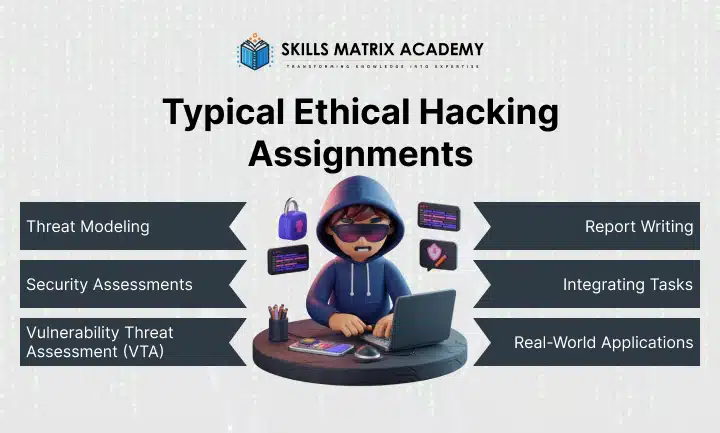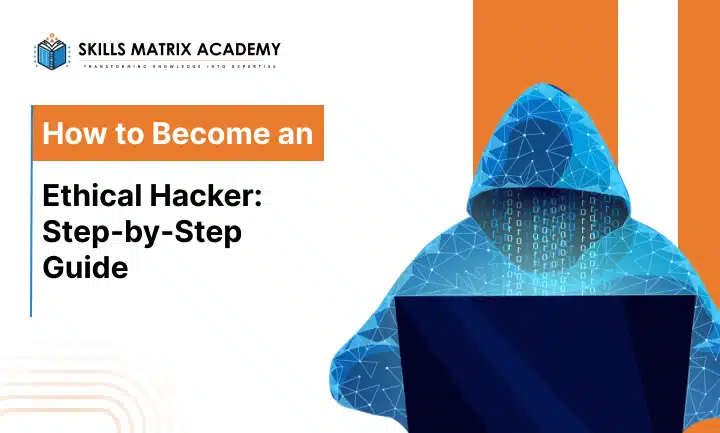Cybercrime is rising fast. Today, hackers use tools like malware and deepfakes to steal data and disrupt systems. Because of this, the need for strong cybersecurity has never been higher.
Every day, businesses face new online threats. To stay safe, they depend on ethical hackers — experts who think like attackers but act to protect.
Ethical hackers run fake attacks to test a company’s defenses. This helps them find weak spots and fix them before real hackers strike.
If you want to become an ethical hacker, start with proper ethical hacking training. Enroll in trusted Cyber Security Courses that offer ethical hacking certification and hands-on practice. It’s your path to a rewarding ethical hacking career and a way to fight against cybercrime.
Who is an Ethical Hacker?

An ethical hacker is a cybersecurity expert who thinks like a hacker but acts like a protector. They focus on offensive security — finding weaknesses before real hackers can use them.
You may also hear them called white hat hackers — the “good guys” in the world of hacking. Some people confuse them with penetration testers, but that’s just one part of what ethical hackers do.
What Does an Ethical Hacker Do?
A fully qualified ethical hacker performs many important tasks, such as:
- Vulnerability assessment to find weak points in systems.
- Penetration testing to simulate real attacks.
- Recommending mitigation strategies and security controls.
- Monitoring and responding to ongoing security threats.
- Working with cybersecurity personnel to ensure holistic security across systems.
With the rise in cyberattacks, ethical hacking has become one of the most in-demand paths for anyone aiming to become a cybersecurity specialist.
Role of an Ethical Hacker
Ethical hackers play a big role in today’s online world. They find and fix weak spots before hackers do.
Some work for themselves as consultants. Others work full-time in companies, keeping websites and apps safe.
To do this well, they must understand how hackers think and what tools they use.
Advantages of In-House Ethical Hackers
Having in-house hackers helps a lot. They already know the company’s systems so that they can find weak spots faster. It also saves money compared to hiring outside experts often.
The only drawback? They may get too used to the system and miss new issues.
Value of External Ethical Hackers
That’s where external ethical hackers come in. They see things that internal teams might miss.
Even companies with strong in-house teams hire outside experts for a second opinion. They run tests and mock attacks to make defenses stronger.
Importance of Permission and Scope
Ethical hackers always need written permission before testing. It lists which
systems they can check. They must never go beyond it — this keeps their work safe and legal.
Types of Ethical Hacker Engagements
In cybersecurity functions, testing happens in three main ways:
- White-box testing – The hacker knows everything about the target system. This helps find deeper vulnerabilities quickly.
- Black-box testing – The hacker has no inside info. It mimics a real-world attack from the outside.
- Gray-box testing – The hacker knows some details. It’s like testing a system where the attacker already has partial access.
Many companies use all three methods to get a full picture of their system security, even if it costs more.
Expanding Ethical Hacker Skills
Ethical hacking skills are useful in many cybersecurity jobs. They help analysts, engineers, and developers make systems safer.
Bug hunters and researchers also use these skills to find new flaws in apps and networks.
How to Become an Ethical Hacker: Education, Skills & Certifications You Need

Want to become an ethical hacker? Start with the right training and real-world practice. Learning by doing is just as important as studying. Hands-on work helps you face real cyber threats with confidence.
Degrees and Foundational Knowledge
You can begin with a degree in Computer Science or Cybersecurity. It gives you a strong base in IT systems and security.
You’ll learn programming, network safety, and risk management — everything you need before moving to ethical hacking courses or certifications.
Essential Certifications for Ethical Hackers
You don’t need a degree to start. Many learners take ethical hacking courses that mix theory with real-world practice. These courses help you earn professional certifications faster.
Some widely recognized certifications include:
- CEH (Certified Ethical Hacker) – Proves your expertise in ethical hacking.
- CISM (Certified Information Security Manager) – Offered by ISACA, focuses on secure IT governance and management.
- CompTIA Security+ – A baseline cybersecurity certification from CompTIA that shows your understanding of cybersecurity basics.
These certificates build your skills and boost your chances of getting hired.
Hands-On Training and Networking
Practice is everything. Start with Cyber Security Courses that include labs and real-world challenges. They help you learn how attackers think.
These courses also connect you with industry experts — great for finding jobs. Even without a degree, the right training and certifications can launch your career.
Must-Have Skills to Build a Career in Ethical Hacking

To grow your ethical hacking career, you need both technical and soft skills. Your course will teach the tech part — let’s look at what else matters.
Technical Skills for Ethical Hacking
Ethical hackers need to know coding languages like Python or JavaScript. Coding helps them write scripts and automate security tests.
Ethical hackers must understand how networks work. Knowing things like TCP/IP and VPNs helps you keep them safe.
You’ll also need tools such as Metasploit and Kali Linux to attack tests and fix weak points. Learning these tools is part of every ethical hacking course.
Other technical areas include:
- Operating system fundamentals
- Firewall and intrusion detection systems
- Web application security
- Exploit development and vulnerability scanning
Solid tech skills help you stay ahead of hackers.
Soft Skills for Ethical Hackers
A great cybersecurity specialist needs more than just technical knowledge. Soft skills are crucial to succeed in real-world scenarios.
Ethical hackers care about doing the right thing. They solve problems fast, even under pressure.
They think critically, share problems with the team, and suggest ways to fix them.
Effective communication skills are a “must-have.” Ethical hackers need to liaise with CISOs and collaborate with other IT professionals to implement security measures efficiently.
Adaptability is key. Cyber threats keep changing, so you must keep learning to stay one step ahead.
Typical Ethical Hacking Assignments

Ethical hackers test systems to make them stronger. Their work includes threat modeling, security checks, and writing reports. Every company has different needs, but these tasks are common everywhere.
Many professionals gain these skills through Cyber Security Courses, which combine theory, practical labs, and real-world scenarios.
-
Threat Modeling
Threat modeling helps find system weaknesses and plan ways to stop attacks.
Threats can be malicious, like a denial-of-service attack, or incidental, such as a computer hardware failure, both potentially compromising enterprise assets.
An ethical hacker contributes by mapping possible malicious attacks and their consequences. This ensures the security focus targets the highest-risk areas.
Threat modeling is an iterative process:
Threat modeling has five main steps:
- List what you want to protect.
- Check how your apps protect it.
- Spot possible attacks.
- Focus on the biggest risks.
- Write down how to prevent them.
This approach allows organizations to act proactively, not reactively, against cyber threats.
-
Security Assessments
Security assessments check how safe your systems are. They help you find weak areas and improve protection.
Assessments check for vulnerabilities in IT systems, business processes, and security policies. They help prevent social engineering attacks and identify training needs.
Reports list weaknesses and suggest fixes. Every business, big or small, needs them to stay secure.
-
Vulnerability Threat Assessment (VTA)
A VTA finds and ranks system weak spots based on risk. It also links each threat to the problem it could cause.
VTAs are essential for critical systems such as:
- Information technology systems
- Energy supply systems
- Water supply systems
- Transportation systems
- Communication systems
Organizations, from small businesses to national infrastructure, rely on ethical hackers to perform VTAs.
-
Report Writing
Professional report writing is vital in ethical hacking assignments. Data gathering and vulnerability detection matter only if findings are communicated clearly.
Reports help company leaders make smart security decisions and plan upgrades. For outside consultants, reports are often the primary deliverable. Clear communication ensures management understands risks and countermeasures.
Good writing skills matter too. Many cybersecurity courses teach how to write clear reports.
-
Integrating Tasks
Ethical hackers use all these methods together to get a full picture of system safety
- Threat modeling identifies risks.
- Security assessments evaluate safeguards.
- VTA ranks vulnerabilities by threat impact.
- Report writing communicates findings and solutions.
This process helps companies build stronger defenses and use their budget wisely.
-
Real-World Applications
Ethical hackers apply these skills across environments. In IT, they simulate attacks to test defenses.
Red team leaders test systems on a large scale, while pentesters check smaller parts like apps or networks. Both play key roles in keeping systems safe. Clear reports help teams act fast and fix issues before problems happen.
Frequently asked Questions
-
How to become an ethical hacker after 12th?
You can start your journey in ethical hacking after 12th by joining Cyber Security Courses or ethical hacking certification programs. These courses teach you how to protect computers, data, and networks from hackers. You can also go for a bachelor’s degree in cybersecurity, computer science, or information technology to learn advanced skills.
2. What should I study to become an ethical hacker?
To become an ethical hacker, study topics like cybersecurity, IT, or computer science. These subjects help you understand malware, encryption, and how hackers attack systems. Choose a cybersecurity training course that gives you real-world practice through labs and projects.
3. Is a bachelor’s degree required to become an ethical hacker after 12th?
No, you don’t always need a degree. You can start with ethical hacking courses and build your skills step by step. Still, a bachelor’s degree in cybersecurity can help you get better cybersecurity jobs and career growth later.
4. What skills do I need to start a career in ethical hacking?
You should have both technical and problem-solving skills. Focus on learning:
- Network security – keeping systems safe from attacks.
- System security – protecting operating systems and data.
- Vulnerability analysis – finding and fixing weak points.
- Programming – basics of Python, C++, or Java.
5. How much do ethical hackers earn?
Pay depends on where you work and your experience. In the USA, the average ethical hacker salary is around $119,295 per year. Salaries may differ in other countries.
Starting ethical hacking after 12th with the right Cyber Security Courses can help you learn fast, earn well, and build a successful career in cybersecurity.









